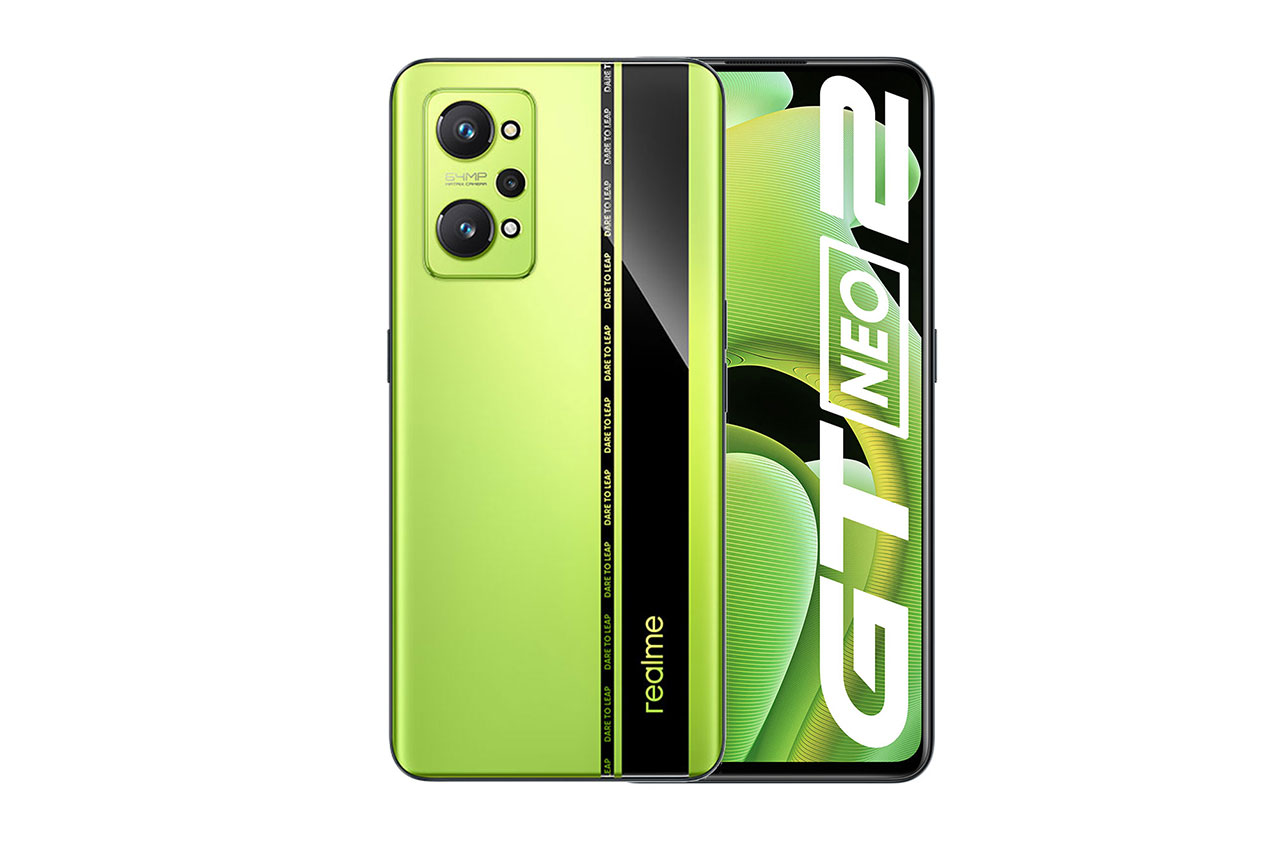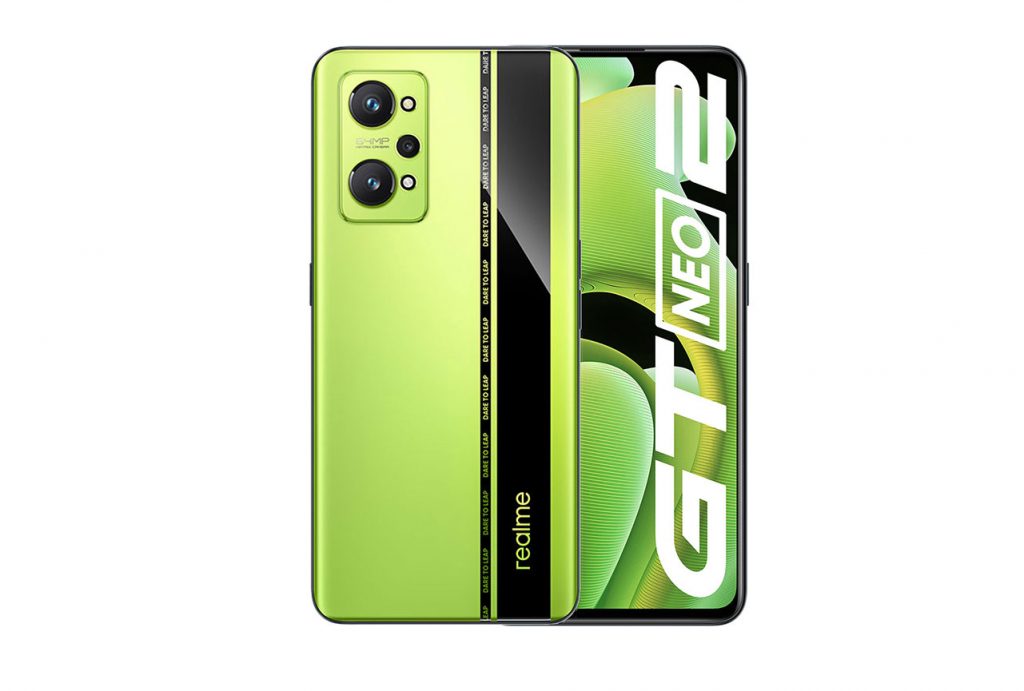The Realme GT Neo 2 5G appeared on the European market in October 2021, and fits into our High-End ($400-$599) segment. Let’s take a look at some of its key battery test results.
Key specifications:
- Battery capacity: 5000 mAh
- 65W charger
- 6.62-inch, 1080 x 2400, 120 Hz OLED display
- Qualcomm Snapdragon 870 5G chipset
- Tested ROM / RAM combination: 256 GB + 12 GB
About DXOMARK Battery tests: For scoring and analysis in our smartphone battery reviews, DXOMARK engineers perform a variety of objective tests over a week-long period both indoors and outdoors. This article highlights the most important results of our testing. (See our introductory and how we test articles for more details about our smartphone Battery protocol.)
Test summary
Scoring
Sub-scores and attributes included in the calculations of the global score.

Realme GT Neo 2 5G


Key performances
These key points are derived from the lab measurements during testing and do not figure into the overall score. The lab measurements, however, are used for the overall score.
 2nd
2nd
 2nd
2nd
Pros
- Very good autonomy (60 hours of moderate use)
- Very fast charging (25 minutes to reach 80%)
- Impressive efficiency, very well-optimized device
Cons
- Low autonomy when calling on the go
- High residual power drain when device is plugged in
The Realme GT Neo 2 5G is a well-balanced device with good performances in all our Battery protocol test categories.
We compared the Realme GT Neo 2 5G’s performance in several key categories with two other high-end devices, the Xiaomi 11T and the Oppo Reno6 5G; battery capacity, tested charger, display type, and resolution, and processor specifications for all three devices are shown in the table below.
| Realme GT Neo 2 5G | Xiaomi 11T | Oppo Reno6 5G | |
| Battery capacity | 5000 | 5000 | 4300 |
| Charger | 65W | 67W | 65W |
| Display type | OLED | OLED | OLED |
| Display resolution | 1080×2400 | 1080×2400 | 1080×2400 |
| Chipset | Qualcomm Snapdragon 870 5G 7 nm | MediaTek Dimensity 1200-Ultra 6 nm | MediaTek Dimensity 900 6 nm |
Autonomy (74)
How long a battery charge lasts depends not only on battery capacity but also on other aspects of the phone’s hardware and software. The DXOMARK Battery autonomy score is composed of three performance sub-scores: (1) Stationary, (2) On the go, and (3) Calibrated use cases. Each sub-score comprises the results of a comprehensive range of tests for measuring autonomy in all kinds of real-life scenarios.
All three devices go toe-to-toe in our Autonomy tests, with the Realme GT Neo 2 5G just edging both the Xiaomi and the Oppo for overall results.
Linearity is also a strong point for the Realme GT Neo 2. Its battery gauge has excellent accuracy: when the UI shows 20% remaining charge, the actual remaining charge is 20.4%.
Battery Life (moderate)
 33rd
33rd
Battery Life (moderate)
 4th
4th

Stationary
Realme GT Neo 2 5G
77
104
A robot housed in a Faraday cage performs a set of touch-based user actions during what we call our “typical usage scenario” (TUS) — making calls, video streaming, etc. — 4 hours of active use over the course of a 16-hour period, plus 8 hours of “sleep.” The robot repeats this set of actions every day until the device runs out of power.
The Realme device lasted about 64 hours in our TUS tests, about 3 hours less than both the Xiaomi 11T and the Oppo Reno6 5G. However, the Realme GT Neo 2 5G was particularly stable at night, losing on average only 0.33% of its battery charge, which is the lowest value in all our database.

On the go
Realme GT Neo 2 5G
61
96
Using a smartphone on the go takes a toll on autonomy because of extra “hidden” demands, such as the continuous signaling associated with cellphone network selection, for example. DXOMARK Battery experts take the phone outside and perform a precisely defined set of activities while following the same three-hour travel itinerary for each device.
The Realme’s on the go results place it slightly below the Oppo device and just ahead of the Xiaomi. The Realme GT Neo 2 showed a particularly stronger performance agains the other devices in GPS navigation.

Calibrated
Realme GT Neo 2 5G
78
100
For this series of tests, the smartphone returns to the Faraday cage and our robots repeatedly perform actions linked to one specific use case (such as gaming, video streaming, etc.) at a time. Starting from an 80% charge, all devices are tested until they have expended at least 5% of their battery power.
The Realme GT Neo 2 5G comes in quite a ways ahead of its two rivals in this category, with a great performance for multimedia usages in general, particularly for music and video streaming.
Charging (101)
The DXOMARK Battery charging score is composed of two sub-scores, Full charge and Quick boost. Full charge tests assess the reliability of the battery power gauge; measure how long it takes to charge a battery from zero to 80% capacity and from 80 to 100%; and measure how long and how much power the battery takes to go from an indicated 100% to an actual full charge. With the phone at different charge levels (20%, 40%, 60%, 80%), Quick boost tests measure the amount of charge the battery receives after being plugged in for 5 minutes.

Full charge
Realme GT Neo 2 5G
95
121
It takes 40 minutes 41 seconds for the Realme GT Neo 2 to fully charge its 5000 mAh battery, which is currently the third-best performance in the high-end segment. It is slightly better than Xiaomi 11T (46 minutes 40 seconds) even though they have the same battery capacity and the Xiaomi charger is 67W. With its smaller-capacity battery, it comes as no surprise that the Reno6 5G achieves a full charge faster (34 minutes 53 seconds).
Charging Time 0-80%
 28th
28th
Charging Time 0-80%
 8th
8th

Quick boost
Realme GT Neo 2 5G
99
111
By plugging in the Realme smartphone for 5 minutes with less than 50% of battery level remaining, users will gain more than 8 hours of autonomy. These are better results than the Xiaomi 11T but behind the Oppo Reno6 5G.
| Realme GT Neo 2 5G | Xiaomi 11T | Oppo Reno6 5G | ||
| Autonomy boost (hh:mm) | 20% | 8:34 | 7:55 | 11:35 |
| 40% | 8:25 | 7:53 | 10:12 | |
| 60% | 5:47 | 8:03 | 7:12 | |
| 80% | 4:09 | 4:45 | 5:32 | |
| Percentage boost | 20% | 20.9 % | 16.9 % | 24.7 % |
| 40% | 20.5 % | 16.8 % | 21.8 % | |
| 60% | 14.1 % | 17.2 % | 15.4 % | |
| 80% | 10.1 % | 10.1 % | 11.8 % | |
| Energy consumed | 20% | 5024 mWh | 4110 mWh | 5060 mWh |
| 40% | 4933 mWh | 4087 mWh | 4457 mWh | |
| 60% | 3393 mWh | 4174 mWh | 3151 mWh | |
| 80% | 2439 mWh | 2466 mWh | 2417 mWh |
Efficiency (99)
The DXOMARK power efficiency score consists of two sub-scores, Charge up and Discharge rate, both of which combine data obtained during robot-based typical usage scenario testing, outdoor mobility testing, charging evaluation, and power measurements, and then take into consideration the device’s battery capacity.

Charge up
Realme GT Neo 2 5G
79
105
The Realme GT Neo 2 5G has a higher residual power drain when the smartphone is plugged in, but it has good charge up and adapter efficiency.

Discharge
Realme GT Neo 2 5G
102
121
The GT Neo 2’s discharge current is well controlled overall, especially in gaming and when streaming video either via 4G or WiFI. It also puts in an impressive performance during night idle and when streaming music, with considerably lower consumption than its rivals.
Conclusion
The Realme GT Neo2 5G is a very well balanced device. It demonstrates good capabilities in autonomy, as well as great charging time and excellent efficiency.

 English
English 中文
中文

DXOMARK invites our readership (you) to post comments on the articles on this website. Read more about our Comment Policy.